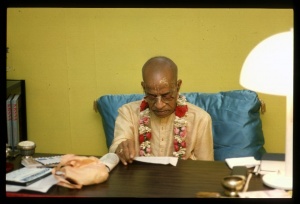SB 7.7.28

A.C. Bhaktivedanta Swami Prabhupada
TEXT 28
- tasmād bhavadbhiḥ kartavyaṁ
- karmaṇāṁ tri-guṇātmanām
- bīja-nirharaṇaṁ yogaḥ
- pravāhoparamo dhiyaḥ
SYNONYMS
tasmāt—therefore; bhavadbhiḥ—by your good selves; kartavyam—to be done; karmaṇām—of all material activities; tri-guṇa-ātmanām—conditioned by the three modes of material nature; bīja-nirharaṇam—burning of the seed; yogaḥ—the process by which one can be linked with the Supreme; pravāha—of the continuous current in the form of wakefulness, dreaming and deep sleep; uparamaḥ—the cessation; dhiyaḥ—of the intelligence.
TRANSLATION
Therefore, my dear friends, O sons of the demons, your duty is to take to Kṛṣṇa consciousness, which can burn the seed of fruitive activities artificially created by the modes of material nature and stop the flow of the intelligence in wakefulness, dreaming and deep sleep. In other words, when one takes to Kṛṣṇa consciousness, his ignorance is immediately dissipated.
PURPORT
This is confirmed in Bhagavad-gītā (BG 14.26):
- māṁ ca yo 'vyabhicāreṇa
- bhakti-yogena sevate
- sa guṇān samatītyaitān
- brahma-bhūyāya kalpate
"One who engages in full devotional service, who does not fall down in any circumstance, at once transcends the modes of material nature and thus comes to the level of Brahman." By the practice of bhakti-yoga, one immediately comes to the spiritual platform, transcendental to the actions and reactions of the three modes of material nature. The root of ignorance is material consciousness, which must be killed by spiritual consciousness, or Kṛṣṇa consciousness. The word bīja-nirharaṇam refers to burning the root cause of material life to ashes. In the Medinī dictionary, yoga is explained by its result: yoge 'pūrvārtha-samprāptau saṅgati-dhyāna-yuktiṣu. When one is put into an awkward position because of ignorance, the process by which one can be freed from this entanglement is called yoga. This is also called liberation. Muktir hitvānyathā-rūpaṁ svarūpeṇa vyavasthitiḥ (SB 2.10.6). Mukti means giving up one's position in ignorance or illusion, by which one thinks in a way contrary to his constitutional position. Returning to one's constitutional position is called mukti, and the process by which one does this is called yoga. Thus yoga is above karma, jñāna and sāṅkhya. Indeed, yoga is the ultimate goal of life. Kṛṣṇa therefore advised Arjuna to become a yogī (tasmād yogī bhavārjuna). Lord Kṛṣṇa further advised in Bhagavad-gītā that the first-class yogī is he who has come to the platform of devotional service.
- yoginām api sarveṣāṁ
- mad-gatenāntarātmanā
- śraddhāvān bhajate yo māṁ
- sa me yuktatamo mataḥ
"Of all yogīs, he who always abides in Me with great faith, worshiping Me in transcendental loving service, is most intimately united with Me in yoga and is the highest of all." (BG 6.47) Thus one who always thinks of Kṛṣṇa within the core of his heart is the best yogī. By practicing this best of all yoga systems, one is liberated from the material condition.